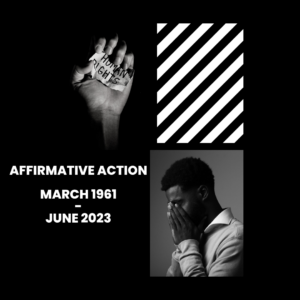Grieving Affirmative Action
President John F. Kennedy signed an executive order on March 6, 1961, creating what we know as “affirmative action.” Affirmative action’s sole purpose was to remove the practice of discrimination in the hiring and admissions process. Let’s pause for a moment. Much like inclusion, affirmative action did not and does not mean exclusion (we will come back to this). Many may say that “Affirmative Action” helped create what we now know as the Black Middle Class (note that affirmative action did not suddenly catapult minorities into the top 1%).
We never needed to question whether it was “time” to abolish Affirmative Action; rather the question should have been “have we honestly made progress to function without it?” If we are to be honest with ourselves, we know that we have not. We still battle with inequities in corporate America that lead to race and gender pay gaps. Unfortunately, if you have never experienced discriminatory practices, you won’t be able to truly understand how far this sets us back. I’m sure there’s also a group that may not care because either way they aren’t affected.
While we are discussing progress (or lack thereof), it’s helpful to know that the median household income of white Americans still sits at a startling ten times greater than the median black household. Disappointingly, even with affirmative action, minorities are still facing inequitable access to things such as employment, adequate and quality housing, high performing schools, and yes basic things like grocery stores (i.e., food deserts). Inclusion is not a middle school PE class where we pick some for our team and not others. Inclusion simply means everyone has a voice and a seat at the table that they desire, deserve, or need.
We may not see the immediate impact of the elimination of Affirmative Action, but we are sure to see an increased gap between majority citizens and our harder to reach populations in institutions of higher learning and C-Suites.
As an individual that has faced my share of discrimination and isolation WITH protection in place … I don’t have high hopes for positive equitable outcomes WITHOUT it.




















